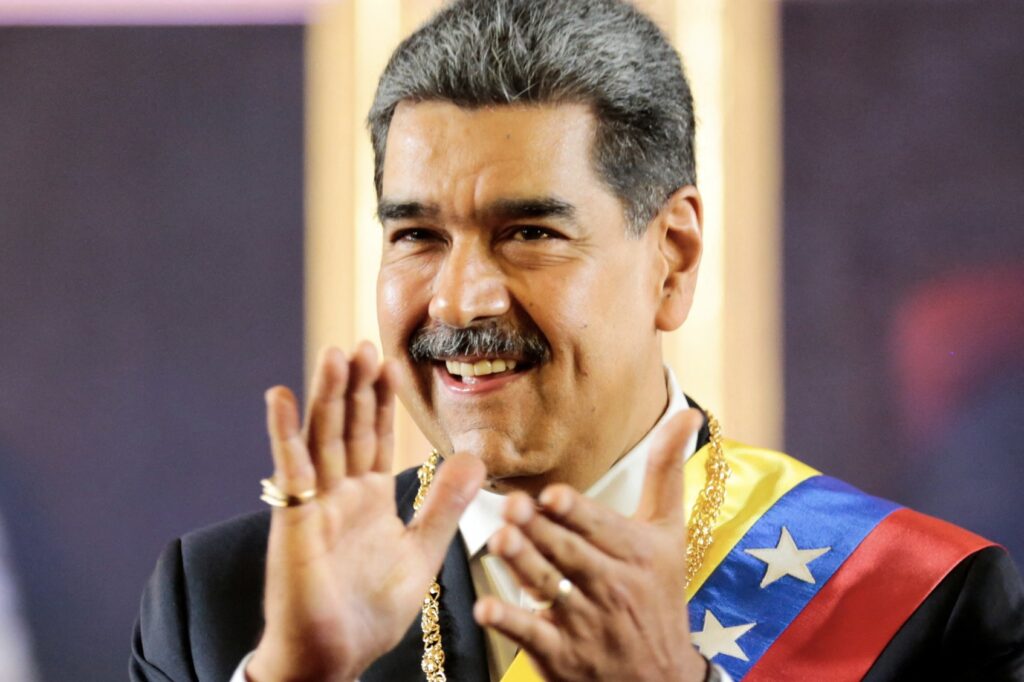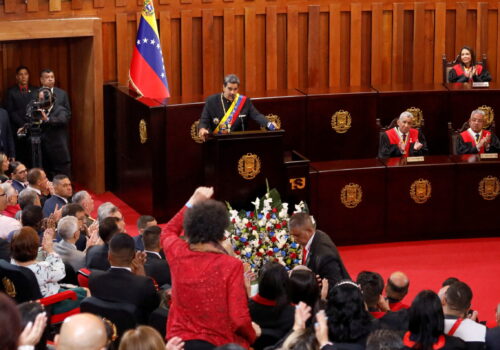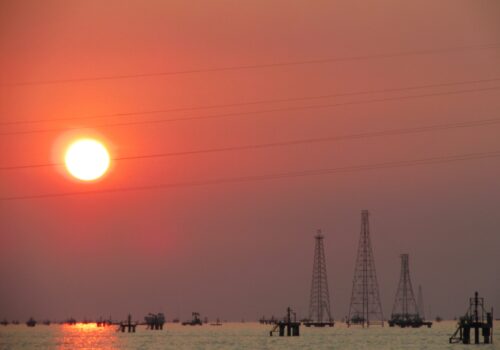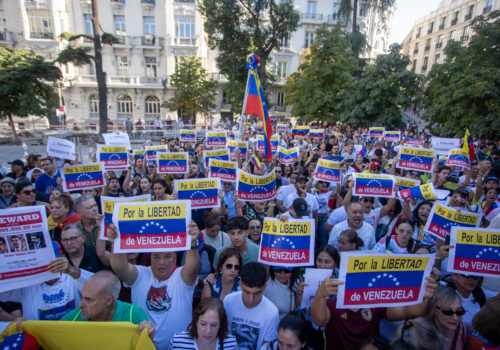Meet the new boss, same as the old boss. On Friday, Venezuelan strongman Nicolás Maduro was sworn in for a third six-year presidential term, six months after an election widely viewed as stolen in Maduro’s favor. Vote tallies collected by the opposition after the election showed that opposition candidate Edmundo González, not Maduro, secured more votes. Ahead of Friday’s inauguration, the Maduro regime cracked down on dissent, including by temporarily detaining María Corina Machado, another prominent opposition leader. Maduro digging in comes as the Biden administration imposed news sanctions on Venezuelan officials, and as many leaders in the Western Hemisphere, including US President-elect Donald Trump, expressed their support for González. So, what’s next for Venezuela? Atlantic Council experts share their insights below.
Click to jump to an expert analysis:
Geoff Ramsey: Trump should take note of the Maduro regime’s internal tensions
Iria Puyosa: The new sanctions are insufficient to remove Maduro from power
Lucie Kneip: The Venezuelan opposition will need to unite around a theory of change
Latin American leaders across the political spectrum are rejecting Maduro’s power grab
The voting tally sheets overwhelmingly showed that González won Venezuela’s presidential election on July 28, 2024. It’s even a point on which Trump and US President Joe Biden agree. Both have referred to González as president-elect, with Trump doing so over social media yesterday following the reported detention—and release—of opposition leader Machado.
So, in what type of country does a president lose an election—and there’s evidence to back it up—but then goes ahead and assumes another term anyways? “It’s a dictatorship,” says Chile’s president, Gabriel Boric, in reference to Maduro’s government. Boric is one of many Latin American leaders who have categorically rejected Maduro’s claim that he won the July presidential election. On that point, there is agreement among Boric on the left to Argentinian President Javier Milei and Panamanian President José Raúl Mulino on the right—both countries which González has visited. González also visited the United States in the past week, where I had a chance to speak with him.
In a fragmented and polarized region, what Maduro has achieved is to bring leaders from across the political spectrum together to reject his new power grab. Brazil, Colombia and Mexico—although not recognizing Maduro’s win—unfortunately had representatives present at today’s inauguration. But at least the presence was limited to the current ambassadors serving in the country. Perhaps the highest-level foreign official at the inauguration was the speaker of Russia’s Duma, Vyacheslav Volodin.
The continued large-scale regional rejection of Maduro is no small feat. The region is historically divided. But the critical question is how to avoid complacency and leverage this unity to further support the democratic opposition. Regional governments, including the incoming Trump team, should accelerate diplomatic coordination to give new momentum to the opposition and to make life harder for Maduro and his accomplices. At the same time, these governments should work to avoid burdening the Venezuelan people with more hardships. It’s a delicate tightrope to walk, but it’s necessary to give further hope to the overwhelming number of Venezuelans who cast a vote for democracy and freedom in July.
—Jason Marczak is vice president and senior director at the Atlantic Council’s Adrienne Arsht Latin America Center.
Trump should take note of the Maduro regime’s internal tensions
By assuming yet another illegitimate mandate based on a fraudulent election, Maduro has confirmed that he is willing to cling to power at all costs. Opposition leader Machado and election winner González are deeply popular in Venezuela, but Maduro has the guns and thugs on his side—and he’s not afraid to use them. Yet in spite of the mounting number of political prisoners and the recent reported detention and release of Machado, it is easy to overstate how strong Maduro really is.
In the wake of July’s stolen election, Maduro has had to reconfigure his cabinet completely, placing more and more power in the hands of hardliners in the Chavista coalition. A key benefactor of Maduro’s drive to assume a new mandate is Interior Minister Diosdado Cabello, a longtime rival who Maduro has kept at arm’s length since taking power in 2013. Entrusting him as top enforcer may well be a sign of just how few friends Maduro has left inside Chavismo. Others in the coalition, meanwhile, may well have doubts about the idea of six more years of economic chaos, violence, and international isolation.
When Trump takes office on January 20, his team should take careful note of these internal dynamics. The goal should be to combine pressure with incentives that can disrupt regime cohesion, presenting key figures in the ruling coalition with dilemmas in a way that makes a democratic transition more appealing than clinging to power. For this strategy to work, the next US administration will have to keep sanctions policy nimble and responsive to events on the ground, and avoid a “set it and forget it” approach. Sanctions alone are unlikely to unseat Maduro, unless they are accompanied by a clear roadmap to lift them, giving fence-sitting regime figures a blueprint to follow. The first Trump administration’s Democratic Transition Framework, presented in 2020, laid out a vision for change involving power sharing and reconciliation, and it may be worth dusting off this time around as well.
—Geoff Ramsey is a senior fellow at the Atlantic Council’s Adrienne Arsht Latin America Center.
The new sanctions are insufficient to remove Maduro from power
In response to Maduro’s illegitimate swearing-in for another term as president of Venezuela—despite González’s electoral victory—the Biden administration has slightly increased pressure on his authoritarian regime. The new measures include raising the rewards for Maduro and Cabello to a maximum of twenty-five-million dollars and sanctions against two thousand individuals involved in repression, violation of human rights, and electoral fraud. However, the US oil company Chevron’s license to operate in Venezuela remains in place.
Indeed, the new sanctions are insufficient to remove Maduro and Cabello from power. The ruling coalition, which White House representatives are now labeling as “narcoterrorists,” can continue to collaborate with transnational criminal networks that include allies in Iran and Russia while simultaneously increasing repression against democratic political leaders and human rights defenders in Venezuela.
Venezuelans are again taking to the streets in large numbers, demanding a transition to democracy and the inauguration of González. The Biden administration has an opportunity to take more decisive action to support Venezuela’s democratic re-establishment. Helping to pave a clear path for Venezuela’s return to democracy could become a significant legacy for Biden in the Western Hemisphere. Delaying meaningful action could risk losing this crucial opportunity, especially since the opposition is now strategically united, the people are mobilized, and the ruling coalition is showing cracks.
—Iria Puyosa is a senior research fellow at the Atlantic Council’s Digital Forensic Research Lab.
The Venezuelan opposition will need to unite around a theory of change
Maduro’s illegitimate re-inauguration is the latest scheme in the authoritarian government’s campaign to eliminate resistance to its consolidation. To add insult to injury, regime affiliates briefly detained Machado during her first public emergence after months of hiding, rattling supporters domestically and abroad. While swaths of the Venezuelan opposition quickly condemned her detention, it remains to be seen how the opposition will respond to tests of its ability to unify in 2025, given differences in attitudes toward electoral participation, negotiations, and pressure tactics.
Heading into the 2025 subnational elections, opposition coalition candidates will have to determine whether it’s worth throwing their hat in the ring given the electoral conditions. Some may decide that the government’s blatant fraud at the national level will be even more easily achieved at the local level, while others may seek to draw on the infrastructure of their strongholds to procure as much regional power as possible, in which case they will need to develop a clear strategy of mobilization. The regime will seek to exploit these conflicting strategies to undermine the opposition’s political will to rise to the occasion.
Maduro’s government has historically proven adept at taking advantage of internal divisions by providing opportunities for disgruntled splinter groups within parties to gain footing by positioning themselves more closely to regime affiliates. This strategy of party cooptation is likely to continue in many of the major parties unless the opposition can find a way to resolve internal differences and coordinate on defining a theory of change.
Beyond electoral participation, opponents of Maduro will continue to face repression through the targeting of political figures, journalists, and human rights activists, as well as crackdowns on protests and digital censorship. Maduro’s best strategy is to stoke fear and fatigue with protests and mobilization. International allies will be critical in supporting political participation and free speech as Maduro seeks to further stifle these tenets of democracy.
—Lucie Kneip is a program assistant at the Adrienne Arsht Latin America Center.
Going forward, the US should better balance oil sanctions with sanctions against individuals
As Maduro illegitimately steps into office for his third term today, Venezuela’s oil sector is in sustained yet marginal recovery. In recent months, Venezuela surpassed the one-million-barrel-per-day milestone for the first time since mid-2019.
The oil sector in Venezuela has been experiencing a secular decline since the early 2000s, and production output from Venezuela’s degrading oilfield infrastructure began to drop dramatically during the first half of 2014. An oil price crash sent dominoes cascading for Venezuela’s state oil company, Petróleos de Venezuela, SA, which faced declining demand at the same time as it confronted a sizeable volume of maturing debt, the beginning of central bank monetization, and intensifying operational inefficiencies.
The sanctions imposed on the oil sector under the “maximum pressure” campaign from 2018 to 2022, spanning the Trump and early Biden administrations, exacerbated but did not cause this decline. However, the strategy did divert most of Venezuela’s oil to China at discounted prices, and led Iranian service company NIORDC to play a key role in maintaining output. Phantom traders from China and Iran handled virtually all of Venezuela’s exports in 2021.
The recent uptick in Venezuelan oil output has come with the reentry of Western firms, most substantially since April 2024 under the US Treasury Department’s policy of “specific licensing.” Under this policy, individual firms can seek authorization from the Office of Foreign Assets Control to operate in Venezuela under transparent and restricted terms, which strictly limit remuneration to Maduro’s enablers. Under this policy, approximately half of Venezuela’s exports have been routed to the United States or to Europe since May 2024. This effectively represents a diversion from China and increases transparency.
There is doubt that a renewed maximum pressure strategy would achieve its aims. In any case, it is incumbent on the Treasury Department to ensure that Maduro cannot use the oil sector as a cash cow, and to continue to tighten its clasp around Maduro’s network of enablers through individual sanctions.
—William Tobin is an assistant director at the Atlantic Council’s Global Energy Center, where he focuses on international energy and climate policy.
Further reading
Wed, Jan 8, 2025
Recalibrating the use of individual sanctions in Venezuela
Issue Brief By Geoff Ramsey, Lucie Kneip
As Maduro consolidates power in Venezuela, who has the United States sanctioned—and are those sanctions working?
Tue, Dec 3, 2024
There’s a more effective way forward than “maximum pressure” for Venezuela
EnergySource By
Following the fraudulent outcome of Venezuela's July election, there is growing pressure on the United States to reintroduce sanctions to expel Western firms from the nation’s oil sector. However, preserving the existing policy, which restricts the regime’s financial access while promoting energy security and countering foreign influence, might prove more effective.
Wed, Sep 18, 2024
To prevent further destabilization in Venezuela, regional leaders must trade chaos for coordination
New Atlanticist By Lucie Kneip
To help move Venezuela toward a transition of power and greater stability, democratic countries must align their policies toward Caracas.
Image: Venezuela's President Nicolas Maduro applauds after being sworn in for a third six-year term, in Caracas, Venezuela January 10, 2025. Milagros Nunez/Miraflores Palace/Handou



